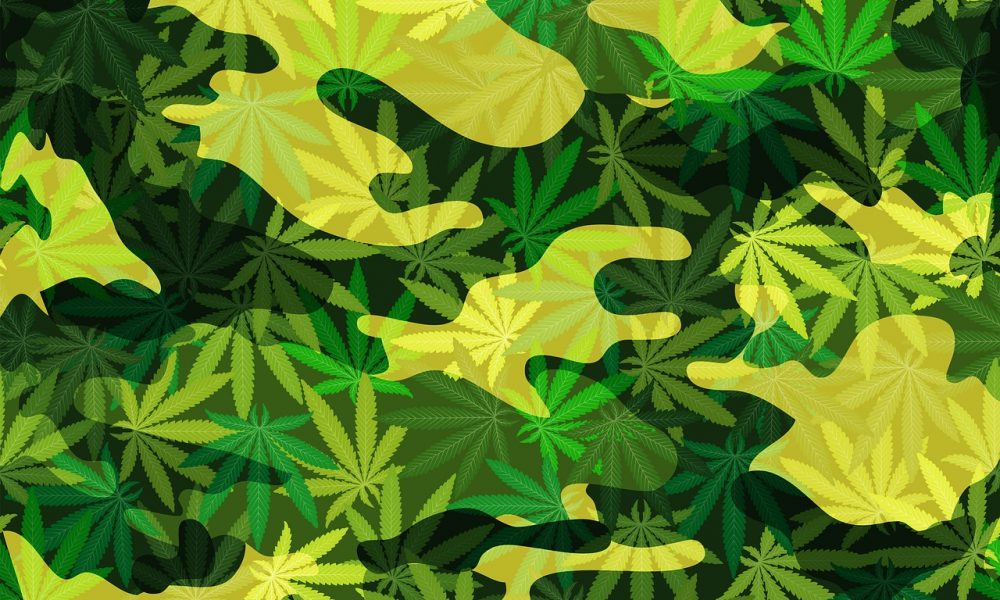Six in 10 active duty military service members and veterans—as well as 85 percent of military family members—support legalizing marijuana, according to a new Ohio State University study that surveyed 1,168 people on their attitudes around recreational drug legalization.
Meanwhile a minority of veterans—4 in 10—favor legalizing psychedelics, compared to majorities of family members and non-military respondents—59 percent and 61 percent, respectively.
Even sharper differences in opinion arose between veterans and other groups in answers about cocaine and heroin, the poll found. Legalizing those drugs had 37 percent support among veterans, compared to much lower numbers—between 10 percent and 20 percent—among family and non-military participants in the study.
The results “showed that a majority of individuals, regardless of veteran status category, supported the legalization of recreational marijuana,” authors wrote in the research paper, published by OSU’s Moritz College of Law Drug Enforcement and Policy Center. “The results also showed that a majority of veteran families and non-military individuals supported the legalization of recreational psychedelics (the veteran support level was modestly lower at 40%).”
“Finally, a large majority of respondents from all veteran status categories did not support the legalization of cocaine and heroin for recreational use,” they added. “Overall, these results indicate differing levels of support depending on drug type and whether one is a veteran, a family member of a veteran, or non-military.”
According to a new DEPC @OSU_Law and @ChrrOSU survey, a majority of individuals, regardless of their veteran status category, supported the legalization of recreational marijuana. Explore additional findings: https://t.co/uh04vyud7b pic.twitter.com/7QXVLOtg4B
— Drug Enforcement and Policy Center (@OSULawDEPC) January 18, 2024
Replicating studies and additional investigation is needed, the study says, to better understand the area of research.
Support among veterans was markedly higher when it came to doctor-recommended use of marijuana and psychedelics, which an earlier OSU study published last month discussed.
That paper found 72 percent support among veterans for Veterans Administration (VA) doctors to be legally allowed to recommend marijuana and 64 percent support when it came to psychedelics.
Those proportions were nevertheless lower than among military family members and non-military respondents.
In Congress, meanwhile, lawmakers are pushing to keep provisions in a large-scale federal spending bill that would allow VA doctors to issue medical marijuana recommendations to veterans living in legal states.
That reform would achieve the same policy outcome as a standalone bill that was refiled on the House side in March by Congressional Cannabis Caucus co-chairs Reps. Earl Blumenauer (D-OR) and Brian Mast (R-FL).
The Veterans Equal Access Act has been introduced several times in recent years with bipartisan support—and moved through committee and floor approval a number of times—but has yet to be enacted. Blumenauer, who is retiring at the end of this Congress, has made the modest reform a priority even as he’s pushed for broader legalization.
Congressional lawmakers this past November, meanwhile, held a first-ever hearing on psychedelic-assisted therapy for military veterans.
In August, bipartisan congressional lawmakers expressed “deep concern” over a recently updated VA marijuana directive that continues to prohibit its doctors from making medical cannabis recommendations to veterans living in states where it’s legal.
They said the decision to maintain the “harmful policy” on cannabis recommendations is especially “alarming” in the context of VA’s latest clinical guidance on PTSD, which strongly recommends against using medical cannabis as a treatment option.
“Many veterans already report using cannabis for medical purposes as a substitute for prescription drugs and their side effects,” they said, adding that a recent survey of veterans who use cannabis found that they report improved quality of life and reduced use of certain prescription drugs, including opioids.
VA has updated its cannabis guidance before, adding language in its 2017 version that explicitly encouraged VA doctors to discuss veterans’ marijuana use, for example.
In April, Senate Republicans separately blocked a procedural vote to advance a bill to the floor that would promote VA research into the therapeutic effects of marijuana for military veterans with conditions such as post-traumatic stress disorder (PTSD).
The medical cannabis recommendations amendment was one of relatively few drug policy reform measures to make it through the GOP-controlled House Rules Committee, which has consistently blocked such proposals from bipartisan members this session.
However, it did advance a Republican-led amendment to the National Defense Authorization Act (NDAA) that would require Department of Defense (DOD) funding of clinical trials exploring the therapeutic potential of certain psychedelics for active duty military service members. Following bicameral negotiations, the reform was ultimately included in the final deal that President Joe Biden signed into law late last year.
Military Veterans Who Received Psychedelic Ibogaine Treatment Saw ‘Dramatic’ And ‘Life-Changing’ Improvements In PTSD And Depression, Stanford Study Finds
Read the full article here

